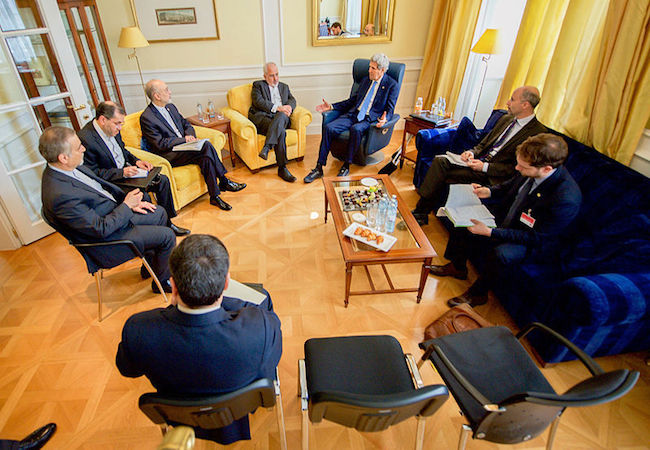Iran deal and its way forward

By Beenish Altaf
World’s six major powers, the US, UK, China, Russia and France plus Germany managed to conclude a nuclear deal (Joint Comprehensive Plan of Action) with Iran after the four missed deadlines and an extended negotiations of 20 months. Since the last deadline was also not met, therefore, the US Congress has 60 days to review and debate the deal. Congress could pass a resolution to approve or disapprove the agreement, which would be subject to a veto by Obama meaning thereby, he actually warned that he would veto any legislation that prevents the successful implementation of the deal. This historic agreement concluded to restrain Iran’s nuclear development program in exchange for its sanctions relief.
Robin Wright in his write up, An Iran Deal, At Last, recounts that the agreement is the Obama Administration’s boldest foreign-policy initiative. It marks the first success in dealing with Iran since its 1979 revolution and the prolonged convulsion of the American Embassy in Tehran. Whereas, Israeli President Benjamin Netanyahu believes it to, be a ‘historic mistake of the world,’ giving the reason that the accord will allow Iran to work towards developing nuclear capabilities. ‘The agreement would also lift a pack of United Nations restrictions on the nation’s power including the arms embargo after five years, and the ballistic missile ban after eight, as long as the country abides by the terms of the deal.’ This concept is second by the US Senate Democrats and top military leaders and rest of the critics also.
Moreover, it will also introduce broader UN inspections for monitoring, permanently on both declared and suspected nuclear facilities, including the military sites “where necessary, when necessary” if nuclear activity is suspected there even after the deal expires.
Even though, the US-Iran nuclear accord is aimed by President Obama to make the world a better place to live in, i:e., more safe and secure, but contrarily to it many other states believe the opposite of it. It sets off a furious political struggle in the US itself along with a diplomatic showdown with America’s most important allies in the Middle East. Pragmatically, the neighboring countries of Iran have a vital role to play in this wake as the accord will have an impact on the regional stability also. For that matter, Israel and the Sunni powers like Saudi Arabia have concerns about the accord between the global six super powers and Iran that it will further destabilize the Middle East region, well undeniably that is for sure. On the other hand, it might be seen as Iran an emerging regional power in the Middle East with the support of the US and the rest of global community.
Senator Robert Menendez, a New Jersey Democrat and former chairman of the Senate Foreign Relations Committee, said, “We have gone from preventing Iran having a nuclear ability to managing it.” It would also minimize the number of centrifuges used to enrich uranium by two-thirds. ‘It cuts back on the number of facilities that enrich uranium—down to one—and requires the conversion of a facility being built to produce plutonium.’
‘The hope is that the deal will make another Middle East war less likely, at a time when the United States is engaged in air wars in Iraq, Syria, and Libya and selling arms to Saudi Arabia to wage its war in Yemen. It may stall or prevent a nuclear arms race in the Middle East, the world’s most volatile region. As Congress and the American people review this deal, it will be important to consider the alternative,” Obama said. “Without this deal, there is no scenario where the world joins us in sanctioning Iran until it completely dismantles its nuclear program.’
Nevertheless, ‘this is a moment where Iran has an important opportunity to make a humanitarian gesture to bring Americans home.’ At the same time, the mentioned accord will no doubt allow some opportunities for Iran also to remove its mischaracterizations about its nuclear matter to fizzle off or fade off by the passage of time. ‘Iran envisions that this JCPOA will allow it to move forward with an extremely peaceful, indigenous nuclear program, in line with scientific and economic considerations, in accordance with the JCPOA, with a view to building confidence ans encouraging international cooperation.’
In addition, it provides a positive and pragmatic prospect for Iran as it was already suffering from approx. four Billion Dollar monthly. At the same, ‘lifting various punitive economic sanctions will open up Iran’s consumer-hungry citizens to international markets. According to some sources, the country’s population has more than doubled since the revolution, to almost eighty million people.’




